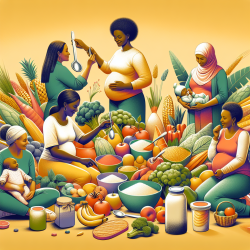In the realm of maternal health, nutrition plays a pivotal role in ensuring the well-being of both mothers and their children. A recent study titled "Categorizations of Trust and Distrust in the Classifications and Social Representations of Food among Pregnant and Breastfeeding Women in Spain—Applying the Cultural Domains’ Pile Sort Technique" sheds light on how pregnant and breastfeeding women perceive food safety. This research offers valuable insights that practitioners can utilize to enhance their skills and improve outcomes for their patients.
The Study's Framework
The study conducted by Muñoz et al. employed the cultural domains' pile sort technique to explore how 62 pregnant and breastfeeding women from Catalonia and Andalusia categorize foods based on trust and distrust. Through focus groups and pile sorts, researchers identified key attributes that influence these perceptions, such as food origin, processing methods, and nutritional properties.
Key Findings
- Trust in Fresh Produce: Fruits and vegetables are generally trusted due to their inherent nutritional properties. However, concerns about pesticides in intensive agriculture were noted.
- Ambivalence Towards Fish and Meat: While these are valued for their nutritional content, concerns about production methods lead to ambivalence.
- Mistrust of Processed Foods: Prepared or precooked products are often distrusted due to unknown additives and processing methods.
- Cultural Influences: The study highlights the importance of cultural knowledge in shaping dietary choices among pregnant and breastfeeding women.
Practical Applications for Practitioners
Practitioners can leverage these findings to better address the nutritional concerns of pregnant and breastfeeding women. Here are some strategies to consider:
- Personalized Nutrition Counseling: Tailor dietary recommendations to align with cultural preferences while addressing concerns about food safety.
- Educational Workshops: Conduct sessions that educate women on reading food labels, understanding food origins, and making informed choices.
- Cultural Sensitivity Training: Enhance your understanding of cultural influences on food perceptions to provide more empathetic care.
- Collaboration with Food Safety Experts: Work with experts to develop resources that reassure women about the safety of certain foods.
Encouraging Further Research
This study opens avenues for further exploration into how cultural perceptions influence dietary choices during pregnancy and breastfeeding. Practitioners are encouraged to engage in or support research initiatives that delve deeper into these dynamics. Such efforts can lead to improved maternal health outcomes by fostering a more comprehensive understanding of food trust issues.
To read the original research paper, please follow this link: Categorizations of Trust and Distrust in the Classifications and Social Representations of Food among Pregnant and Breastfeeding Women in Spain—Applying the Cultural Domains’ Pile Sort Technique.










